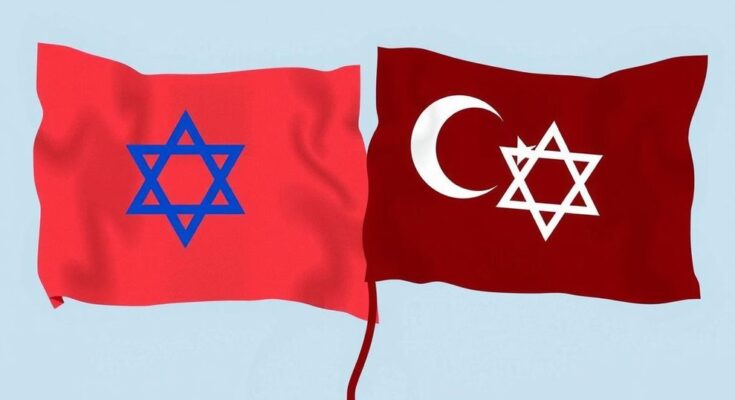Tensions between Turkey and Israel are escalating due to the Syrian conflict and Erdogan’s support for Palestinians, especially following protests in Istanbul. The potential for military confrontation looms as both nations seek influence in the region. Historical frictions and the impact of recent wars underscore the precarious balance of their relations, making diplomatic management crucial to avoid conflict.
The increasingly strained relations between Turkey and Israel are on the verge of further escalation due to the ongoing conflict in Syria. Following recent protests in Istanbul against Israel, in support of Palestinians, Turkish President Recep Tayyip Erdogan’s long-standing anti-Israeli stance has become more pronounced, particularly amidst the backdrop of the war initiated by Hamas on October 7, 2023. As the chaos in Syria deepens, potential confrontations between Turkey and Israel loom larger, especially as both nations vie for influence in the region.
Erdogan’s perception of the conflict as just another cycle of violence changed as he realized Israel’s comprehensive military campaign against Hamas. The geopolitical balance in the Middle East is shifting, with Turkey attempting to expand its authority over US-backed Kurdish groups in Syria, which have historically enjoyed covert support from Israel. Scholars, such as Dr. Hay Eytan Cohen Yanarocak and Prof. Efrat Aviv, suggest that an unprecedented military confrontation is possible as tensions rise at Israel’s border with Turkey.
Historically, the relations between Israel and Turkey have been tumultuous, with significant frictions stemming from Erdogan’s outspoken criticism of Israel, particularly following the Gaza flotilla incident in 2010. While attempts at reconciliation have occurred, including diplomatic visits and improved trade relations, they have often unraveled amid renewed tensions, particularly regarding the Gaza conflict and Turkey’s support for Palestinian interests.
As Erdogan faces substantial domestic pressure regarding his foreign policy direction, his aggressive stance towards Israel may intensify. Netanyahu’s far-right government has also emphasized the need to reevaluate diplomatic ties with Turkey. Despite this, both countries seem aware of the necessity to manage relations, given the complex landscape of regional alliances and adversarial forces.
The deteriorating situation in Syria has exacerbated their discord, particularly as both countries now maintain military presences in different regions. While Erdogan seeks to bolster Turkish influence in Syria, Israel has interests in countering Iranian proxies in the region, further complicating an already volatile relationship. The prospect of military conflict remains a serious concern, especially as Israel addresses potential threats along its borders, which could provoke a dangerous standoff with Turkey.
The historical relations between Turkey and Israel have been marked by tension, largely stemming from Turkish President Recep Tayyip Erdogan’s vocal criticism of Israeli policies and support for Palestinian nationalism. The backdrop for their conflict includes the long-standing issue of security and territorial disputes in the Middle East, which are exacerbated by recent developments in Syria. In light of the ongoing war between Israel and Hamas, the risk of escalation has increased as both nations engage in extending their influence in the region.
In conclusion, the evolving dynamics between Turkey and Israel amid the Syrian conflict underscore the volatility of their relationship. Erdogan’s anti-Israeli stance, coupled with Netanyahu’s government pressures, heightens the risk of confrontation. As both countries pursue their strategic interests, the potential for military conflict cannot be disregarded, especially within the complex geopolitical landscape of the Middle East. Continued vigilance and diplomatic engagement are necessary to avert escalation.
Original Source: www.jpost.com




